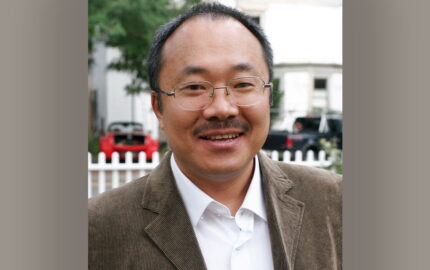CAMBRIDGE, Mass. (March 5, 2008) — The Nieman Foundation for Journalism at Harvard is establishing an award that recognizes journalistic independence and honors the life of investigative journalist I.F. Stone.
The I.F. Stone Medal will be presented annually to a journalist whose work captures the spirit of independence, integrity, courage and indefatigability that characterized I.F. Stone's Weekly, published 1953-1971. Each year, the winner of the award will deliver a speech about his or her own experience with journalistic independence, to be followed by a workshop on the same topic.
Stone, who was born in 1907 and worked for several newspapers before establishing his weekly publication, believed fervently that dissenting voices are crucial in helping keep the United States true to its democratic ideals.
"It is this spirit of independent thinking that challenges punditry and conventional wisdom that we wish to honor," said Bob Giles, curator of the Nieman Foundation. "The press, as an independent bedrock of our democracy, and the freedom of journalists to stand alone and apart from mainstream ideas and political currents are under great stress. Today, Izzy Stone serves as a model of the resolute, provocative journalist who worked against injustice and inequity, and loathed pomposity and false posturing, often at personal cost."
Stone's passion for speaking his mind incurred the wrath of the powerful. His opposition to Sen. Joseph McCarthy and his determination to expose the excesses of the FBI. under J. Edgar Hoover brought him under attack when America was under the influence of McCarthyism in the early 1950s.
The I.F. Stone Medal bears a likeness of an issue of I.F. Stone's Weekly with a headline on the Tonkin Gulf affair, "All We Really Know Is That We Fired The First Shots." Stone was one of only a few journalists who reported on the government's false allegations that the North Vietnamese had attacked a U.S. destroyer; it was the claim President Johnson used to persuade the Senate to approve the Tonkin Gulf Resolution, committing the country to the Vietnam War.
Giles explained that the Nieman Foundation's purpose in creating the award grows from its mission to "promote and elevate the standards of journalism" and its commitment to the Watchdog Journalism Project, a Web site that presents independent assessments of topics in the news and poses questions the press should be asking.
"We hope that the attention drawn to the award and ideas from the workshop discussion will encourage journalistic independence," he said.
An advisory committee of journalists will be formed to establish a process for nominations and selection of the medal winner. It will be chaired by Jeremy J. Stone, elder son of I.F. Stone. Jeremy is the former president of the Federation of American Scientists (1970-2000), and current president of Catalytic Diplomacy.
An endowment fund for the I.F. Stone Medal, with an anonymous matching gift of $100,000, has been established at Harvard University. Donations toward a goal of $200,000 can be made through the Nieman Foundation.
I.F Stone Project Endowment
The Nieman Foundation for Journalism at Harvard
One Francis Ave.
Cambridge, MA 02138
For more information on I.F. Stone, go to www.ifstone.org.
Established in 1938, the Nieman program is the oldest midcareer fellowship for journalists in the world. The fellowships are awarded to working journalists of accomplishment and promise for a year of study at the university. More than 1,200 journalists from 88 countries have studied at Harvard as Nieman Fellows.
The Nieman Foundation publishes the quarterly magazine Nieman Reports and is the home of the Nieman Watchdog Journalism Project, which encourages reporters and editors to monitor and hold accountable those who exert power in all aspects of public life.
The I.F. Stone Medal will be presented annually to a journalist whose work captures the spirit of independence, integrity, courage and indefatigability that characterized I.F. Stone's Weekly, published 1953-1971. Each year, the winner of the award will deliver a speech about his or her own experience with journalistic independence, to be followed by a workshop on the same topic.
Stone, who was born in 1907 and worked for several newspapers before establishing his weekly publication, believed fervently that dissenting voices are crucial in helping keep the United States true to its democratic ideals.
"It is this spirit of independent thinking that challenges punditry and conventional wisdom that we wish to honor," said Bob Giles, curator of the Nieman Foundation. "The press, as an independent bedrock of our democracy, and the freedom of journalists to stand alone and apart from mainstream ideas and political currents are under great stress. Today, Izzy Stone serves as a model of the resolute, provocative journalist who worked against injustice and inequity, and loathed pomposity and false posturing, often at personal cost."
Stone's passion for speaking his mind incurred the wrath of the powerful. His opposition to Sen. Joseph McCarthy and his determination to expose the excesses of the FBI. under J. Edgar Hoover brought him under attack when America was under the influence of McCarthyism in the early 1950s.
The I.F. Stone Medal bears a likeness of an issue of I.F. Stone's Weekly with a headline on the Tonkin Gulf affair, "All We Really Know Is That We Fired The First Shots." Stone was one of only a few journalists who reported on the government's false allegations that the North Vietnamese had attacked a U.S. destroyer; it was the claim President Johnson used to persuade the Senate to approve the Tonkin Gulf Resolution, committing the country to the Vietnam War.
Giles explained that the Nieman Foundation's purpose in creating the award grows from its mission to "promote and elevate the standards of journalism" and its commitment to the Watchdog Journalism Project, a Web site that presents independent assessments of topics in the news and poses questions the press should be asking.
"We hope that the attention drawn to the award and ideas from the workshop discussion will encourage journalistic independence," he said.
An advisory committee of journalists will be formed to establish a process for nominations and selection of the medal winner. It will be chaired by Jeremy J. Stone, elder son of I.F. Stone. Jeremy is the former president of the Federation of American Scientists (1970-2000), and current president of Catalytic Diplomacy.
An endowment fund for the I.F. Stone Medal, with an anonymous matching gift of $100,000, has been established at Harvard University. Donations toward a goal of $200,000 can be made through the Nieman Foundation.
I.F Stone Project Endowment
The Nieman Foundation for Journalism at Harvard
One Francis Ave.
Cambridge, MA 02138
For more information on I.F. Stone, go to www.ifstone.org.
Established in 1938, the Nieman program is the oldest midcareer fellowship for journalists in the world. The fellowships are awarded to working journalists of accomplishment and promise for a year of study at the university. More than 1,200 journalists from 88 countries have studied at Harvard as Nieman Fellows.
The Nieman Foundation publishes the quarterly magazine Nieman Reports and is the home of the Nieman Watchdog Journalism Project, which encourages reporters and editors to monitor and hold accountable those who exert power in all aspects of public life.


